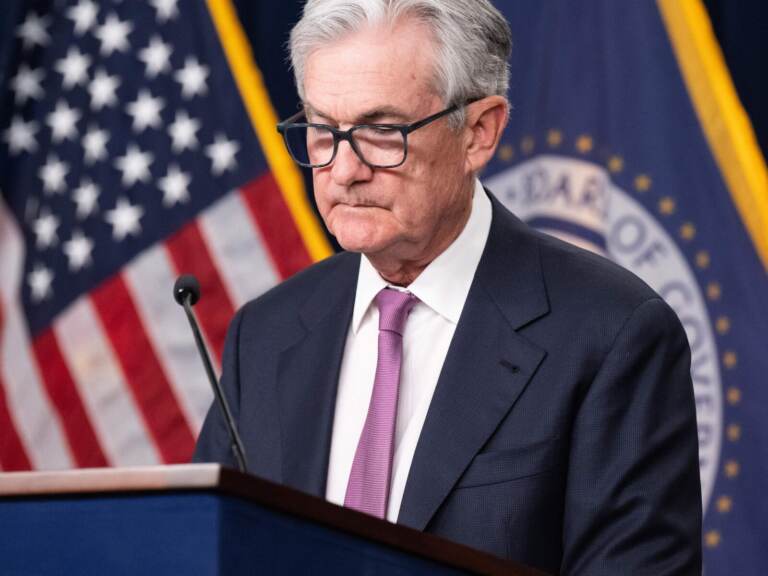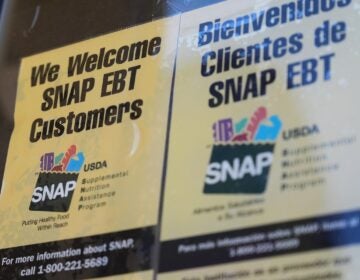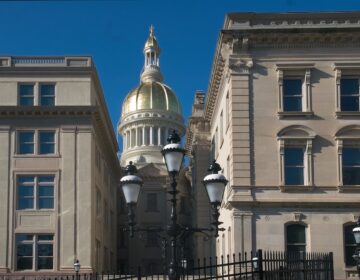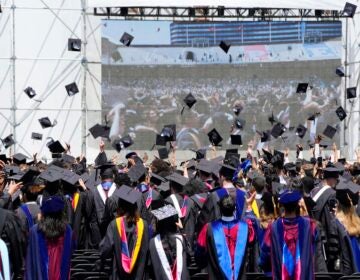The Fed raises interest rates again despite the stress hitting the banking system

Federal Reserve Chair Jerome Powell speaks during a news conference at the Federal Reserve in Washington, DC, on Feb. 1, 2023. (Saul Loeb/AFP via Getty Images)
The Federal Reserve raised interest rates for the ninth time in a row on Wednesday, opting to continue its campaign against high inflation despite stress in the banking industry following the collapse of two regional banks.
Fed policymakers voted unanimously to raise their benchmark interest rate by a quarter percentage point to just under 5%, which will make it more expensive for people seeking car loans or carrying a balance on their credit cards.
Members of the Fed’s rate-setting committee said additional rate hikes may be necessary to restore price stability. On average, policymakers anticipate rates climbing by another quarter-percentage point by the end of this year.
“The Committee anticipates that some additional policy firming may be appropriate,” the Fed said in a statement.
Some observers had urged the central bank to pause its rate hikes, at least temporarily, in order to assess the fallout from the collapse of Silicon Valley Bank and Signature Bank earlier this month.
Stress in the banking system appeared to ease in recent days, however. Treasury Secretary Janet Yellen said Tuesday that large withdrawals from regional banks have “stabilized.” And bank stocks have rallied this week.
Meanwhile, consumer prices continue to climb at a rapid rate. Annual inflation in February was 6% — down from 9.1% last June, but still well above the Fed’s target of 2%.
The central bank is particularly concerned about the rising cost of services, such as airline tickets and streaming TV subscriptions.
“To restore price stability, we’ll need to see lower inflation in this sector,” Fed chairman Jerome Powell told a Senate panel earlier this month.
The Fed is under pressure over bank collapses
The Fed is also facing scrutiny for its oversight of the two failed banks. Fed supervisors reportedly identified problems with Silicon Valley Bank’s risk-management practices years ago, but the problems were not corrected and the California lender had to be taken over by the U.S. government after suffering a massive bank run.
“We need to have humility, and conduct a careful and thorough review of how we supervised and regulated this firm,” said Michael Barr, the Fed’s vice chairman for supervision.
Barr is conducting that review and has promised a report by May 1. He’ll also testify before two Congressional committees next week.
Others have called for an independent probe of the Fed’s role in the bank failures. Senators Elizabeth Warren, D-Mass., and Rick Scott, R-Fla., have also proposed replacing the Fed’s internal inspector general with an outside inspector, appointed by the president.
Recession fears have grown over banking turmoil
The Fed will need to weigh the impact of the collapse of the two regional lenders in deciding how much to raise interest rates going forward.
Since the collapse of Silicon Valley Bank and Signature Bank, other banks are expected to be more conservative about making loans.
“Recent developments are likely to result in tighter credit conditions for households and businesses and to weigh on economic activity, hiring, and inflation,” the Fed statement said. “The extent of these effects is uncertain.”
Tighter credit conditions, like rising interest rates, lead to slower economic growth.
“Credit is the grease that makes small businesses’ wheels run and makes the overall economy run,” said Kathy Bostjancic, chief economist at Nationwide.
“If that credit starts to get choked off,” she said, “you’re going to have a pretty big–I would expect–pullback.”
That could provide an assist for the Fed in curbing inflation. But it also raises the risk of tipping the economy into recession.
Fed policymakers aren’t projecting a recession. On average, members of the rate-setting committee expect the economy to grow 0.4% this year. They expect the unemployment rate to climb to 4.5%, from 3.6% in February.
9(MDAzMzI1ODY3MDEyMzkzOTE3NjIxNDg3MQ001))



